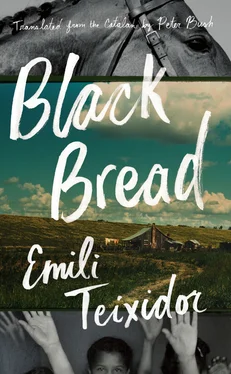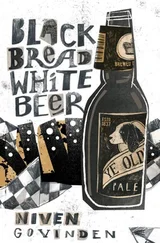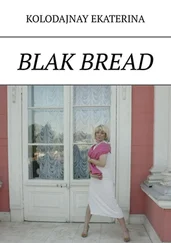Quirze had to shove me in the back to stir me out of my daydreams.
“Come on, they’re waiting for us!” he said.
Soon after, when Aunt Enriqueta cut my plus-fours and turned them into short trousers, Mother gave a sigh of relief. She had no more time to waste washing and ironing, she said. From that day on I didn’t have to wear those long pants, or whatever those ridiculous bloomers were.
Cry-Baby wore a white dress just below the knee, with an ample skirt, a transparent belt round her waist, white gloves, socks and shoes, and a white veil over her face. She looked like an enchanted princess. Sleeping Beauty.
The Saint Camillus monastery chapel was small, narrow and dark. It had choir stalls, a small harmonium and side balconies level with the centre of the stalls, that for Sunday mass would be filled by novices in white habits and the infirm wrapped in white sheets lying on chairs or stretchers. From down below that whiteness melded the novices and the infirm into a kind of angelic host or limbo replete with pure spirits, innocent little black or white stillborn babes, who’d never tasted life, phantom penitents.
Dad Quirze accompanied us as far as the door, went into the chapel for a moment, but soon walked out on the excuse that he was going for a smoke. The men did that in every parish, they poked their head inside and then spent mass outside having a drag and exhaling smoke through their noses and mouths.
Cry-Baby walked between Ció and Enriqueta like a sick princess. Her white dress made her resemble the novices and TB patients in the choir balconies, like a blessed soul who’d come down to earth.
Quirze and I sat on the bench at the back behind them. Early that morning my mother had rushed at top speed from town to bring me my all-white missal and rosary beads. Núria didn’t have mementoes to give or visits to make to show off her dress or collect presents, because Dad Quirze said that kind of fancy behaviour wasn’t for country folk, that such ceremonies were for city dwellers, and he criticized the fact that townsfolk copied everything the nincompoops in Vic and Barcelona did, and the workers too, who were people with their feet on the ground, like farmer labourers, but had been infected by the bad habits of factory owners and shopkeepers who lived far from the land and shamelessly aped the habits of city bosses and phoneys, thinking that was the way to clean off the dung still sprinkling their backs, upstarts, as Father Tafalla called them.
When we got back to the farmhouse, Cry-Baby refused to play with us while we waited for lunch. She said she might get her white dress dirty. The grownups had let her wear it the whole day and she walked through the upstairs and attic galleries scaring off any dog that came near and gripping her missal and rosary beads like a novice.
Quirze and I called to her from the plum tree, but she never deigned to answer. It was as if she had rediscovered herself, as if she’d seen herself in her Sunday best, all la-di-da, to the manner born, as if she now only heeded the inner voices she must have heard that morning for the first time. I imagined she must have experienced those things someone taking First Communion was supposed to feel, the kind of spiritual ecstasy the clergy spoke about in catechism classes, celestial voices and a sensation of joyous fulfilment that transformed one into a species of archangel protected against the mire of sin by the goodness of God. I was rather envious of Cry-Baby because of that touch of grace she’d apparently experienced and that I’d never tasted. In contrast, Quirze ignored his cousin’s strange behaviour. He remarked in his surliest tone: “That lunatic thinks she’s turned into a nun. She’s not right in the head. The least thing drives her crazy,” and he shouted, “Come here! Climb up the plum tree, you blessed charmer, or we’ll take over your branch. If you don’t come today, you’ll never be able to climb up here again. Even if you stay inside, you’ll still dirty your clothes.”
But she ignored us and walked through the gallery and sitting room as if in a trance; she said Grandmother Mercè, Aunt Ció and Aunt Enriqueta wanted her to show off her dress the whole day and they kept making her go to and fro and parade across the sitting room so they could see her properly, like a bride, who would never be as dazzling as she was then, and they wouldn’t let her sit down, so her feet were sore, she added.
We had lunch upstairs in the summer dining room, and the array of plates gleamed more brightly than ever, and stood out against the lurid blue of the walls, a bright fair-ground blue, the most revolting, artificial blue possible that stung your eyes and convinced you they should strip it off that very minute.
“They’re a left over from the Carlist war,” Grandmother always told visitors, “when the owners still lived here. One day they’ll remember all the crockery they left and take it to their house in Vic or flat in Barcelona, and none of this furniture will be left. They’re not short of a house or two.”
Father Tafalla and the bubbly, bald novice accompanying him were the only people invited. Ció, Aunt Enriqueta and Mother cooked and served lunch, ferrying trays continually from downstairs kitchen to upstairs dining room. Grandmother was head at one end of the table and Father Tafalla at the other, with Dad Quirze, Bernat, Jan the oldest hand and almost one of the family, the young novice and we three, Quirze, Cry-Baby, still dressed up to the nines, and me along the sides.
Grandmother and the Father Superior initially drove the conversation. They talked about the medicinal herbs Grandmother collected and dried out in the attic and compared her way of doing things to the friars’ methods and explained the places in the woods where they found — Grandmother said “scavenged”—the different species; then they talked about the old folk in the nearby farmhouses and their ailments and when the cannelloni was finished and they brought up the capons in a couple of earthenware dishes, they exchanged cooking tips, regretting the fact the women labouring over the stove couldn’t be there to add a practical touch to their recipes.
“Never feel sorry for the cooks,” laughed Grandmother. “Just remember how they never bring anything to the table they haven’t already tasted. They are the first to enjoy the flavours. They have healthy appetites and always dip into the dishes they’re cooking.”
Now and then she’d look our way and encourage us: “Hey, you starving kids! What a spread!”
I reckoned Grandmother chose lovely words to enhance the feast, as if they were her present to her granddaughter, because it was the first time I’d heard them.
Sullen as ever, Dad Quirze’s eyes glinted and he merely nodded, going along with everything that was said, adding commonplaces like: “You bet!” “God willing!” “They can eat as much as they want. If only people ate as well in towns and cities! That crew, you know…!”
Nevertheless, halfway through the meal, perhaps spurred on by the continuous flow of red wine from bottle to glass they downed with such pleasure, he began to talk to the young novice sitting next to him: “Well…?” he asked. “Isn’t this tastier than the reheated hash they serve up in the monastery?”
The youth smiled shyly and nodded. The delicate sky-blue of his eyes was in stark contrast to the loud, garish blue of the walls and ceiling. He had white, fragile skin, an amiable, symmetrically featured face, a straight nose, thin, finely curved eyebrows, cheeks that looked to have endured lots of penitence, small ears, fleshy red lips and a head that was so bald there was no way of telling whether his crown was shaved down the middle of his skull, what friars called a tonsure, or not.
Читать дальше












